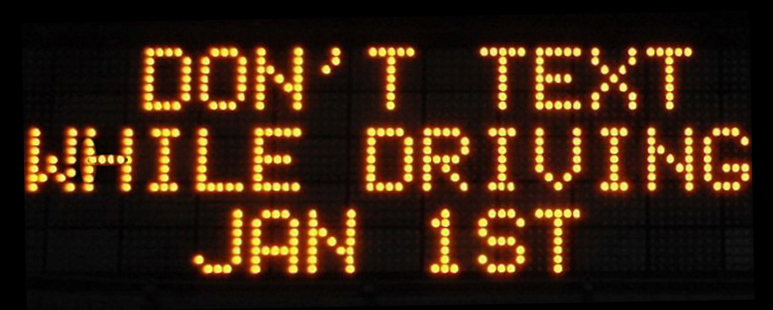Chronic distracted drivers have a bit less to celebrate with the arrival of the new year.
Two states made moves Jan. 1 to crack down on those who drive while fiddling with their electronic devices. Several others are settling into big changes made during 2019.
In Florida, full enforcement of the texting & driving law went into effect Jan. 1. The Florida Highway Patrol and other law agencies had delayed primary enforcement of the existing texting & driving rules, as well as the new school- and work-zone restrictions on cell phones.
The Sunshine State’s new texting policy technically took effect July 1 — making violators subject to strict enforcement — but the ever-present state troopers held off six months. The hands-free law for school zones and work zones went into effect Oct. 1 but there also was a warning period.
Law officers can now pull over motorists they see texting, instead of needing another resulting offense (such as swerving or running a light).
“We’ve encouraged (troopers) to write warnings until Dec. 31,” FHP Chief Mark Brown said. “Jan. 1, we will say do what you would normally do. We did the same thing with seat belts.”
House Bill 107 removed the secondary enforcement cap on the distracted driving laws and added the school- and work-zone restrictions. It was signed into law by the governor May 17. Florida already had a texting & driving ban, but enforcement was spotty at best due to the secondary enforcement limits.
The state still allows motorists to talk on cell phones. House Bill 249 awaits the return of legislators, seeking to ban handheld cell phone use by all motorists.
Florida’s $30 fine for texting & driving cashes out at about $100, after court fees. The base fine for using a handheld cell phone in school zones and work zones is $60.
Gov. Ron DeSantis has called texting & driving “one of the worst of all driving distractions.”
“As a new year begins, I am proud to give law enforcement the ability to fully enforce the Wireless Communications While Driving law,” DeSantis said.
In Illinois, lawmakers closed a loophole that allowed for watching video while driving. Senate Bill 86 was a simple edit of the existing law regarding use of electronic communications devices while behind the wheel. It was signed into law by the governor Aug. 9 and went into effect Jan. 1.
Taking effect in Illinois in July are increased penalties for causing bodily harm or death while using an electronic communications device. They rise to $1,000 plus a one-year license suspension. July 2019 saw all offenses relating to electronic communications devices become moving violations.
In Massachusetts, a hands-free driving law takes effect Feb. 23. Violators receive warnings until March 31. Fines to range from $100 to $500. Enforcement is primary. Gov. Charlie Baker signed the bill Nov. 24. Massachusetts was the last state in New England to allow drivers to hold their mobile phones.
A handful of other state distracted driving laws went into effect at midyear 2019:
- In Tennessee, a hands-free law was enacted in hopes of cutting into the state’s high number of distracted driving crashes. Motorists are now barred from holding a smartphone or similar device with any part of their bodies.
- In Maine, a handheld cell phone law took effect in mid-September, addressing what officials called “a big distraction problem.”
- In Virginia, handheld cell phone use in a road construction zone became illegal at midyear.
- In Minnesota, a new handheld cell phone law took effect Aug. 1.
Long-resistant Arizona adopted a hands-free law in 2019, but the state will have to wait another year to see it take effect.
Also, up in Saskatchewan, Canada, fines for electronic distracted driving are poised to more than double as of Feb. 1. “Enough is enough,” said Joe Hargrave, the minister who oversees Saskatchewan Government Insurance. A first offense will bring distracted drivers a $580 fine plus 4 demerit points vs. the license. A second offense within a year brings a $1,400 citation, plus 4 points and a weeklong vehicle seizure. A third offense brings a $2,100 fine, and another 4 points and the seizure.



Can we believe states are against distracted driving when they allow talking on a hands-free phone? Hands free is not risk free yet it is encouraged. It’s a form of distracted driving which can lead to crashes. And that is the bottom line. There is money to be made in the form of tickets and taxes on the transactions that flow from a crash.